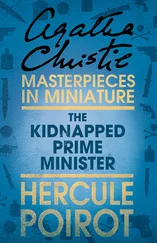William Kingston - The Prime Minister
Здесь есть возможность читать онлайн «William Kingston - The Prime Minister» — ознакомительный отрывок электронной книги совершенно бесплатно, а после прочтения отрывка купить полную версию. В некоторых случаях можно слушать аудио, скачать через торрент в формате fb2 и присутствует краткое содержание. Жанр: foreign_prose, на английском языке. Описание произведения, (предисловие) а так же отзывы посетителей доступны на портале библиотеки ЛибКат.
- Название:The Prime Minister
- Автор:
- Жанр:
- Год:неизвестен
- ISBN:нет данных
- Рейтинг книги:5 / 5. Голосов: 1
-
Избранное:Добавить в избранное
- Отзывы:
-
Ваша оценка:
- 100
- 1
- 2
- 3
- 4
- 5
The Prime Minister: краткое содержание, описание и аннотация
Предлагаем к чтению аннотацию, описание, краткое содержание или предисловие (зависит от того, что написал сам автор книги «The Prime Minister»). Если вы не нашли необходимую информацию о книге — напишите в комментариях, мы постараемся отыскать её.
The Prime Minister — читать онлайн ознакомительный отрывок
Ниже представлен текст книги, разбитый по страницам. Система сохранения места последней прочитанной страницы, позволяет с удобством читать онлайн бесплатно книгу «The Prime Minister», без необходимости каждый раз заново искать на чём Вы остановились. Поставьте закладку, и сможете в любой момент перейти на страницу, на которой закончили чтение.
Интервал:
Закладка:
Don Luis, surprised at the compliment, for he could not conceive how the minister knew anything about him, could only bow in return; nor was he particularly pleased with its authoritative tone, as coming from a man whom he had been taught to consider, on account of his birth, but of little consequence; particularly when he heard threats uttered against the class to which he belonged. The Minister, eyeing the young man narrowly, to observe the effect of his observations, then addressed a few sentences to Captain Pinto, during which time Don Luis, happening to look in the direction of the secretary, observed that his glance was fixed on him; but it was immediately withdrawn, the latter person applying himself studiously to his occupation; it was, however, sufficient to attract Don Luis’s attention more especially to his countenance, which he could not help fancying that he had seen somewhere before, and at no great distance of time. It was not probable that he had met him abroad, so that it could have been only on the previous day; – perhaps he had passed him in the street – for he possessed only an undefined, dreamy sort of recollection of the countenance; – when, on a sudden, it struck him that those expressive eyes and features were the same he had for a moment seen in the corridor of the Jesuits’ College. Yet it was extraordinary that a person employed by one who was a professed enemy of that order should have been found holding communication with them, and he felt confident that the secretary had either been playing false to his master, or deceiving in some way the holy fathers. However, he wisely, for the present, kept his counsel: determining, as in duty bound, to take the first opportunity of mentioning his suspicions to his cousin, Father da Costa, between whom and the Minister he knew there was no cordiality. He had just arrived at this conclusion, when Carvalho again turned to him, making many minute inquiries about his travels in England, which showed him, notwithstanding his declarations to the contrary, to be well acquainted with the laws and customs of that country. “Ambassadors,” he observed, “have less chance than any other strangers of learning the true state of a country; it is the interest of everybody round them to blind their eyes; and if they attempt to move about incognito, and alone, they are considered as spies, and every action is watched. In despotic countries, such as Austria, and I hear also in Russia, the matter is much worse; and I have heard of the whole country, by the borders of a road, being populated, and villages built, on the occasion of the visit of some distinguished personage, which vanished when he had passed by; though he went away with the impression that it was one of the most fertile and populous countries in the world.”
The Minister smiled at his own story, as, in duty bound, did his guests, and Don Luis began to doubt that he could possibly possess the violent and sanguinary temper which was reported: he made many more inquiries, and seemed much pleased with the answers Don Luis gave; then, in the most bland, and courteous manner, informed him and Captain Pinto, that he would no longer detain them, begging the former to call upon him on his return to Lisbon. As they rose to depart, Don Luis caught the eye of the secretary again turned towards him, with a sort of inquiring glance, but he had no opportunity of observing further, as he was obliged to follow the captain from the room.
As they were crossing a corridor, and about to descend the stairs, a young girl passed them, with light ringlets falling over her shoulders, and laughing blue eyes. In no way abashed at sight of the strangers, she bowed gracefully, and bounded on. “Who can that fair creature be who passed us?” asked Don Luis.
“The eldest daughter of the Minister by his present wife, Donna Leonora, Countess Daùn, whom he married during the time he was envoy at the Court of Austria;” answered Captain Pinto; “she shows her mother’s Saxon blood.”
“Yes, and her high birth,” said Don Luis: “she is very beautiful.”
“Very,” was the Captain’s laconic reply.
“You appear to have pleased Senhor Carvalho,” observed Captain Pinto, as they walked homeward; “I should advise you to profit by the advantage.”
“Why so? he will probably soon forget me,” said Don Luis.
“Indeed he will not. He takes an interest in your welfare, from a youthful friendship for some member of your family, who is no more, and from whom he received some deep obligation, which he would repay to you; and now you understand why he desired to see you.”
Volume One – Chapter Seven
The Portuguese, with much naïveté , relate a story which is told against them, that Noah, a few years ago, paid a visit to this our planet, on which he once on a time played so conspicuous a part; but that, as he travelled from country to country, and kingdom to kingdom, his fond anticipations of reviving the early recollections of his living days were far from being gratified; for not a spot of earth which his rather numerous progeny now inhabit could he recognise, so many changes had all undergone, and nowhere did he find himself comfortably at home till he arrived on the shores of Lusitania. How did his heart beat with tender remembrances, as he travelled through the country! “Ah!” he exclaimed, enraptured, “this is indeed the land I love; the self-same as I left it: the same system of agriculture, the same style of architecture, the identical roads, not a stone removed, a few more ruts, to be sure, caused by passing time, like the wrinkles in a friend’s face; the same manners, and the same customs. Ah! beloved Portugal, constant and unchangeable; here will I take up my abode.” Saying which, the venerable patriarch pitched his tent, where he sojourned during his stay on earth; and the inhabitants, in hope of being honoured by another visit, still adhere to the same system.
Now, although there can be no doubt that the above is a very witty story, we can assure our readers that it is not perfectly correct in all respects, inasmuch as there are fine churches, though it is difficult to determine the order of their architecture; and there are palaces and castles, which we do not in history find there were when Noah dwelt upon earth; but we do very strongly suspect that the roads, if there were any, could not have been worse. Also, with respect to inns, or houses of public entertainment, they cannot be very much improved since his time; for anything more execrably bad than they generally are, in any country within a week’s sail of England, can scarcely be conceived; and we have good reason to suppose that they have not very much altered since the days of the Marquis of Pombal.
In describing, therefore, a Portuguese country inn of a hundred years ago, the picture of one of the present day will fully answer our purpose, even of that to which we are about to conduct our readers, which yet exists with few marks of change about it. It stands on the northern edge of a wild sandy common, broken into irregular hillocks, partially sprinkled with gum-cistus, gentian, the flowering heath, and other low shrubs and plants, while, in the far distance, is perceived the long dark line of a pine-forest. The ground on the other side of the inn is cultivated, though very imperfectly; and here and there a few mean cottages may be seen, with heaps of dirt in front, and pools of mud, in which the favoured pigs of the inhabitants delight to wallow. The inn is a long low building, the bush hung out on a pole in front being the sign that all are welcome to enter, as was once the custom in England. The walls are of rough stone, having a row of windows, with red shutters, rather battered, and destitute of glass, on the upper story; but the only opening on the ground floor is the large entrance door, which leads at once into a spacious stable, strewed with straw, and with no very great attention to cleanliness; a manger, running round it, without any divisions for stalls; so that the animals therein may, at will, amuse themselves by kicking at each other, free from those unsocial restraints which English civilisation has introduced; very like a certain class of liberals, who would do away with wholesome laws, much for the same sensible object. This is decidedly the best part of the building, as much attention being paid to the comfort of the animals as to that of their owners; though, by a partition of rough deal boards, an apartment is separated from it to the right, which serves the purpose of kitchen, parlour, and bedroom, to the greater part of the family and guests. On a low hearth, on one side of it, a wood fire blazes, the smoke escaping through the doors and windows, as it best can; and on the walls, near the fire-place, are hung a few large and very ordinary kitchen utensils, the other parts being adorned with horse furniture, rows of onions, dried fish, and other provisions of the coarsest sort. A rough deal table and benches run close to the wall the whole length of the apartment; and there is a shorter one on the opposite side, near the fire. The floor is of clay, perfectly black, and beaten hard, but worn into irregular undulations and holes where most trodden on. We are now describing the past and the present, and probably the future, for many years to come, though we cannot pierce the gloom of the dark abyss of time; but as our business is rather with the past, we prefer adhering to that tense. The further end of the room opened into a sort of stable-yard, from which freely entered at all times several long-legged, thin white swine, with a youthful progeny of grunters, who were allowed to satisfy their inquisitive natures, if not their appetites, by poking their snouts into every pan or utensil they met with in their peregrinations, receiving now and then a gentle rebuke, administered with the bottom of a frying-pan, by the nimble-handed damsel who officiated as chief of the culinary department, accompanied by a no very complimentary epithet, at which they grunted forth their disapprobation, and continued the same proceedings. Besides the pigs, numerous fowls appeared to be welcome visitors, being allowed to establish their roost on the rafters of the roof, in one corner, and to hop about and pick up what escaped the vigilance of the yet more favoured animals. Nor must we forget, having begun with the dumb species, instead of the nobler part of creation, to mention two or three dogs, whose appearance was far from prepossessing, as they stalked about among the guests, in eager expectation of the morsels thrown to them, or of the crumbs which fell from the table. They were of a dirty yellow colour, their heads something like that of a fox, but with bodies lean and gaunt as a wolf, to which race they appeared to belong. Such is the large dog of the country; but there is every gradation of shape, size, and colour, down to the smallest turnspit, to give any specific name to which would be impossible. Having described the dogs, we must now mention the agile Griskenissa, the youthful queen of those regions. She was a laughing-mouthed damsel, her lips rather thick and full, disclosing the most pearly teeth, her nose retroussé , between a pair of large sparkling black eyes, and her figure rather more fully developed, particularly about the bust, than would accord with the Venus de Medicis. A rich bloom brightened the nut-brown tint of her not very delicate complexion, whose dark hue was increased by her occupations over the fire. Her hair was drawn back, fastened in a knot behind, and covered with a coloured handkerchief, a white one being thrown over her shoulders. The sleeves and skirt of her gown being tucked up, exhibited a pair of stout arms and legs of the same build, destitute of stockings or shoes. The noise of her tongue was, as Captain Rolando, in the “Honeymoon,” describes most unjustly that of her sex in general, like the clatter of a mill; the more she moved about, the faster it went, the grist being the questions and jokes of her guests, to which she failed not to give some sharp repartee. She was aided in the actual work of cooking by an old crone, who, now bending over the fire, was engaged in stirring a mess of broth simmering in a large pot, while a little boy, clothed in the smallest quantity of raiment which could possibly cover his body, was employed in bringing wood to feed the flame. The master of the house generally walked about with his hands in his pockets, a cigarito in his mouth, and his cap set rakingly on one side, by far too fine a gentleman to attend to the wants of his guests, though occasionally, to those of higher degree, he would condescend to make a low bow as they departed, provided they paid well, and shared with him a bottle or so of his best wine.
Читать дальшеИнтервал:
Закладка:
Похожие книги на «The Prime Minister»
Представляем Вашему вниманию похожие книги на «The Prime Minister» списком для выбора. Мы отобрали схожую по названию и смыслу литературу в надежде предоставить читателям больше вариантов отыскать новые, интересные, ещё непрочитанные произведения.
Обсуждение, отзывы о книге «The Prime Minister» и просто собственные мнения читателей. Оставьте ваши комментарии, напишите, что Вы думаете о произведении, его смысле или главных героях. Укажите что конкретно понравилось, а что нет, и почему Вы так считаете.












